- Home
- William Shatner
Live Long and . . . Page 2
Live Long and . . . Read online
Page 2
I have led a fortunate existence. I have been in the right place at the right time, which generally is better than making the “right” choice. I have gotten parts that called for the character to be young and handsome (at least I was young) who could say the words realistically enough but also had to have a look in the eyes, because the camera considered the eyes. I had the right color eyes and Paul Newman wasn’t available. Or the girl had the right look, she had the necessary voluptuousness, and gave off such amazing pheromones that she could a build a career on it until she no longer gave off the same attractiveness. Talent matters, talent matters a great deal, but only if the phone rings.
The most amazing aspect of my life, of my career, is that the phone rang at the right time. Unusual things have always happened to me; that path was being laid for me. When I needed a job, the phone would ring with an offer. When there was a problem, a solution would occur. During an autograph session several years ago, someone on the line gifted me with a lovely bottle of wine. And then, later on that line, someone else gave me a corkscrew. Why did that happen? Who brings a corkscrew to an autograph session? But it did happen; it did. I have learned to accept those mysteries and to appreciate them. But I still wonder, Why? I wonder if there is a pattern to my life that I haven’t seen. I do know with certainty that there is far more in this world than I can understand. There is a world beyond the known world. I’ve seen that; I have seen the future become the present and then the past. I have seen the toys of Star Trek become the tools of everyday life. My life has spanned from the marvels of radio to the wonders of performing holograms. I know that I am endlessly intrigued by those things I don’t know. But I do know there is more.
I am at an age when I can look back on my life and see the things that really mattered, those things that made a difference, and those that, while seemingly important at the time, had absolutely no impact on my life. It is both surprising and odd to look back over all those years and see which events mattered.
We are, all of us, the direct result of our childhood. Few people ever outgrow the events that shaped us. Somewhere deep inside each of us those childhood feelings continue to exist, and we spend our lives protecting them. The choices we make, the decisions we make, can most often be traced directly to those events. It is amazing to me those things that I remember. If I want to remember certain events or people, I can, but those aren’t the events that have made such an enormous impact on my life. Just pause here for a minute, lean back, and think about your earliest childhood memories. The first thoughts that pop into your mind. Don’t try to analyze them or direct your thoughts. Just close your eyes and enjoy the show.
The thread that has run through my life is loneliness. Even as a child I was never part of a group. I don’t know why. It was not by choice. Maybe because I was Jewish in a predominantly non-Jewish school. But I was fighting all the time. I had very few friends. When I walked the ten blocks to school, I would see everybody else walking in a group. I was by myself. I wanted so much to be wanted. When I was in fifth grade, the class celebrated Valentine’s Day by sending valentines to as many people as we wanted to. If you were sweet on a girl, you would send one to her. You might send one to a friend on the football team telling him it was nice to be on same team. I sent six valentines to myself so I would not be humiliated by receiving no valentines. Those were the only six valentines I received. It seems like such a small thing, yet I have never forgotten. I have never forgotten that terrible feeling of being so alone and so desperate to be part of the group. Loneliness was the hell that I lived in as a child.
That has extended to my whole life. I have had many acquaintances, there have been people I have cared about, but I have had very few friends. My closest friend was Leonard Nimoy. We were born four days apart and raised in Orthodox Jewish homes. We shared so much throughout our careers. I loved Leonard, and he used to refer to me as his brother. Yet at the end of his life and for reasons I still don’t know, he was not my friend. I would call him and he wouldn’t answer the phone or return any messages. He died and I didn’t feel welcome at his funeral. The only people who really have known me were my four wives, and with each of them I had a very different relationship.
* * *
The second memory from my childhood that has resonated throughout my life concerns my mother. Oh, here we ago, another Jewish kid with mother issues. But I will go to my death remembering one moment—not simply remembering the words but also remembering the feeling. How casual and innocent it was in that moment, and the implications were an earthquake in my personality. I was no more than seven years old. I remember it so well. I was sitting in the breakfast nook, sunlight was streaming into the room, and she was to my right. I asked the question that every boy probably asks his mother: “Who do you love more, me or Daddy?”
She didn’t even hesitate: “Daddy, because he gives me things.”
And thus psychiatry was born! Believe me, all the psychiatrists in the world couldn’t have put me together again after that. My relationships with women for much of the rest of my life might all be traced to that day. I lived at home until I graduated from McGill University. I was twenty-one years old. I can’t remember great moments, I can’t remember bad moments, but that one moment with my mother remains blazing in my head.
I enjoy watching sports and I often hear athletes at the height of their glory speaking about their mothers in such loving terms: “I’m dedicating this to you, because you were always there.” And when I hear that there’s the feeling of emptiness again. I never felt that way. I never felt that my mother was always there.
There was a time when I tried to fill that sense of loneliness with a woman. I remember the first time I asked a woman to marry me. There was a group at the university that put on plays, including musicals. It was the only group that I was part of in college. I would act or write or even direct some of them. There was a beautiful student assistant who also was a member. She was pretty and sweet, and we started dating. She lived in New York. I went to visit her there and we took a walk in Central Park and I asked her to marry me. I know exactly why I did that: I just didn’t want to be alone. I didn’t have the slightest idea what being married meant. She seemed like a nice person, she was pretty, why not marry her? Fortunately, she said no.
I have been married four times. I have spent my life seeking love. The absence of love has been the major force of my life. When there was a vacuum, it needed to be filled. The women may have changed from time to time, but the need to be married never went away. The need to have someone at my home, waiting for me, wanting me to be home.
I retained an image in my mind of a lighted window. That window represents everything I have been seeking. I was always driving a car or riding on a train, looking at a house in the distance with a lighted window. Maybe the lamp was near the window; the light was amber and yellow. The window was clear and the house was comfortable looking. That lighted window was home, warmth, and love. There was love inside that room. There were arms around you. The meals were served to you to say how much someone was loved. There was a bed and there was passion. All of it was on the other side of that window.
Every journey I took, whether it was for a day or a year, I was looking for that window.
And it was always in the distance.
There were times I saw a window that looked inviting, and I would think, God, if I could just drive up there and knock on the door and say, “Can I stay here for a while?” How many times have I thought there might be someone who would say, “Hey, it’s Bill Shatner; come in and let me put my arms around you”? I spent much of my life settling for much less. I wonder how many times—at the height of my fame—I drove past a hotel on my way to an unhappy home and thought, if I could hide there in that hotel, if I could be anonymous and stay there, then I might be happy.
But I needed to have my dogs there with me. So I would make my way back to another unhappy home and live my unhappy life until it dissolved and became another life.
I learned that simply being married wasn’t enough. In my first marriage I had that lighted window. I had a woman who loved me, and we had three beautiful babies whom I nurtured and loved. It was everything that I had dreamt of—and it was being destroyed by a series of circumstances that I didn’t understand and couldn’t help. It wasn’t enough. I had no control of it. I was not a good husband. I certainly had a lot to learn. I was so unhappy in my first marriage that things got terribly out of hand. And it was my fault.
For so many years I had to stand in front of the camera and be somebody else. While doing Star Trek, I had to carry on with effortless command and be a convincing actor. I had to stand in front of the camera and lie. Well, I did it. I was convincing people I had some control over my own life, that I was making decisions. After Star Trek became a cult hit and we all started getting more attention than any of us imagined possible, some of my cast mates complained that I was aloof. “Shatner is too big or too good for us.”
That was never true. I didn’t know how to be any different. I didn’t know how to be a friend. In reality, I was a frightened child who was losing everything that meant comfort.
When I reach back into my childhood, a third memory emerges that also has made a significant difference throughout my entire life. We lived on the west end of Montreal, which at the time was an English-speaking section. But it truly was the end of the city, so much so that only a block or two away there was a stable that rented riding horses by the hour. People would ride those horses through the farmers’ fields that surrounded the area. I was ten or eleven years old, and I desperately wanted to ride. I had never been on a horse in my life; as far as I was aware, no one in my family had ridden. My father made cheap suits; he didn’t ride horses. My mother worried about looking good, so the thought of her being on a horse is ludicrous. The story I tell is that I cleaned out the stables to earn enough money to rent a horse for an hour, but I don’t think that is completely true. But somehow I got the money and rented a horse. In my memory I was by myself, but I don’t see how that can be true. I don’t think they would have allowed a child who had never been on a horse to go out by himself. It’s sketchy, but in this memory I was in the fields walking along and cantering. At the end of the hour my parents showed up, and I galloped into their presence and I reined in the horse.
That is absolutely true. My mother asked, and these were her words, “Where did you learn how to do that?” I think I responded, “I have been doing it for years.” Which wasn’t true, of course, although in my mind I had been doing it for years. I don’t know why I have the affinity for horses, but throughout my life that has been the one place I have gone that provided solace. I’m a city kid, a guy from Montreal; why is it that I find peace riding a horse?
Horses have also been a continuing thread of my life. Riding them and, when I was financially able, owning them and breeding them. At the worst moments of my life I turned to my horses to find a semblance of peace. After my third wife, Nerine, drowned in our swimming pool, I was twisted in grief. I was completely lost. Nerine was an alcoholic and I had failed to save her. Within two or three days following her death I drove out to the stable. I got on a horse and sat there in the corner of the corral and wept. It is a vivid memory. I walked the horse through the afternoon, my tears just flowing. Day after day, I drove forty-five miles to the farm, sat on my horse, and cried. For a long time the only consolation I had was getting on a horse.
When I am on a horse I am completely in that moment. For my own safety, for the safety of the horse, I have to be right there. My mind can’t be wandering, and so for those hours I was on a horse I had at least a partial escape from my pain. I also have gotten tremendous joy from my horses. I met my present wife, Elizabeth, who was a trainer, through our mutual love of horses. I have seen the value of horses as therapy animals and have spent decades of my life hosting the Hollywood Charity Horse Show, raising millions of dollars for special-needs children.
I have many other memories from my childhood—people and places, the excitement of being on a stage and getting approval—but none of them has the emotional impact of these three events: being so lonely I sent myself the only valentines I received, being told by my mother she loved my father more than me because he gave her things, and being able to ride a horse. At the time each of them took place it never would have occurred to me that more than seventy-five years later they still would be resonating emotionally.
We all have experienced events like these, and they have shaped us no less than a million years of winds and rivers have formed the Grand Canyon. Those are mine; those are the things that I have been responding to in one way or another for a lifetime. They are unique to me, as each individual has his or her own particular memories. But it’s worth trying to figure out which events from your childhood are your emotional anchors. Because so many of the important decisions that we all make as we go through life are in response to those events.
I know my own failings, and I admit them. I have not always been the man I wanted to be. But I have learned some important lessons in all my years as I stumbled through life to success and, even, incredibly as I have to admit, to happiness. Take of it what you will. Use those parts of it that make sense to you. This is the bounty of my life, the sum of my experience.
2. The Show Must Go On
IN DECEMBER 1970, a year after we had finished shooting the third and final season of Star Trek but before it became a cultural phenomenon, I was cast into a new play by a young writer named Mart Crowley. Mart Crowley would later write the magnificent play The Boys in the Band. This was not that play; it was titled Remote Asylum. I played a “physically and spiritually exhausted American” tennis pro. A lovely woman named Nancy Kelly played my “cosmopolitan, not-yet-divorced lover.” The play opened at the Ahmanson Theatre in L.A., which was where we would work out any problems on our way to Broadway.
The play opened with Nancy Kelly and me standing in the darkness saying our opening lines. Then the lights went on and the curtain went up. We had been rehearsing for several weeks. It was a complicated play; the setting was a beautiful Mediterranean villa, which, we will discover, is not a paradise but rather “an inferno where a painful, purgatorial breakthrough occurs.”
On opening night, as we were standing there in the darkness waiting for our cue to begin, Nancy leaned over and whispered those words every actor dreads hearing: “Are we in a disaster?”
Actually, the “painful, purgatorial breakthrough” was the play. We may have suspected it while we were in rehearsals, but we persevered. We did our jobs. The play ran one night.
The reality is actors rarely know if the play or movie or TV pilot they are making is going to be a success or a dismal failure. I have experienced every variation of that; I know enough to know how little I know. I starred in the only full-length movie ever made in Esperanto, the universal language. It was a foreign film in every country in the world. By the time the film was released, I had forgotten the language and even I didn’t understand what it was about. But when we were making it, I worked as hard on it as anything else I have ever done. I didn’t allow my doubts about the quality or the potential to influence my work ethic at all. I showed up and I did my job.
Any success I have had began by my showing up on time, being prepared, and doing the best possible job.
There is a lot to be said for that. That isn’t wisdom; that’s common sense. But in my life, it has made all the difference. “The show must go on” is the actor’s credo, but it can just as easily be applied to anything you do. A good work ethic is the foundation of success. Show up on time prepared to do your job.
I don’t know how not to work. My work ethic is ingrained in me. Working, I have always found, led directly to more work. There is little in life more frightening to me than blank pages in my datebook.
I don’t know precisely when I became obsessed with work. But I am. In January 2016, I was eighty-four years old and was on tour with my one-ma
n show. I was doing eight shows in eight cities in eight nights. I was traveling with one person, Lucky Dave Memory, who was my stage manager and problem solver. We landed at Newark Airport on Thursday night and the following morning we rented a little Fiat to drive to the Westbury Music Fair on Long Island for a show that night. Saturday morning we were scheduled to fly out of LaGuardia to Chicago for a performance at the Rialto Square Theatre in Joliet, Illinois.
On Friday morning, Lucky Dave got in the passenger seat and I drove. I love to drive, but I had never driven a Fiat before. We had a little bit of luggage that barely fit in the trunk. While we were driving to Long Island, we heard the first reports about a major snowstorm heading up the coast from Washington. They were forecasting as much as three feet of snow farther south—although at first they predicted New York would get only three inches. I was concerned but not worried. By the time we got to Westbury, the forecast had been increased to six to eight inches. By late afternoon, it had turned into “a snow event” that might dump as much as three feet of snow on the metropolitan area.
Meanwhile, I’ve got to do my show on Long Island and get to Illinois.
The storm was scheduled to hit New York around midnight. If my show ended on time, I could get to LaGuardia Airport and get a flight to Chicago before it started snowing, and from there I would go to Joliet. My assistant, the tour manager, Kathleen Hays, was doing everything possible to make reservations. We were all set—and then at four o’clock, LaGuardia, JFK, and Newark were closed. I called Kathleen. “What about Hartford?” I said. “Hartford never closes.” It turned out Hartford did have a flight to Chicago, but it made two stops and took six hours. Book it. I didn’t care. I had a show to do.

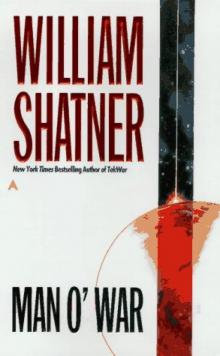 Man O' War
Man O' War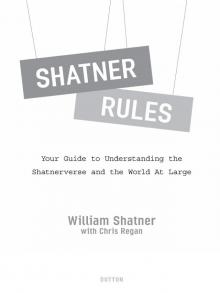 Shatner Rules
Shatner Rules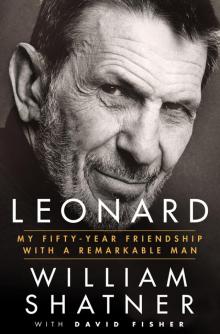 Leonard
Leonard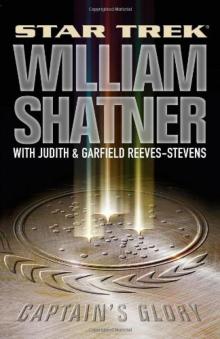 Captain's Glory
Captain's Glory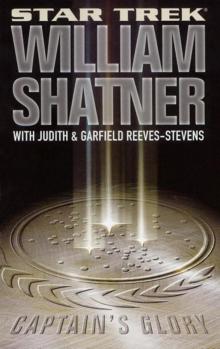 Captain's Glory зпвш-9
Captain's Glory зпвш-9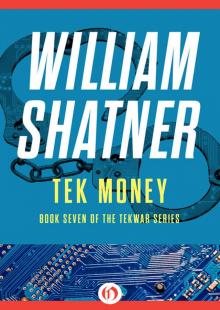 Tek Money
Tek Money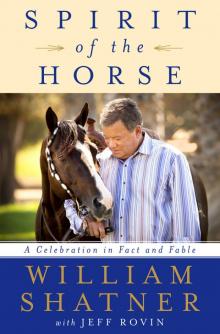 Spirit of the Horse
Spirit of the Horse Tek Vengeance
Tek Vengeance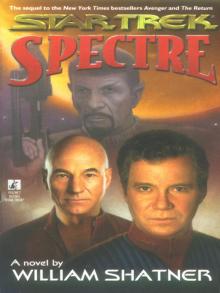 Spectre
Spectre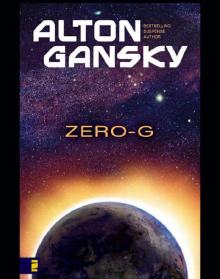 Zero-G
Zero-G Tek Kill
Tek Kill Collision Course
Collision Course TekLab
TekLab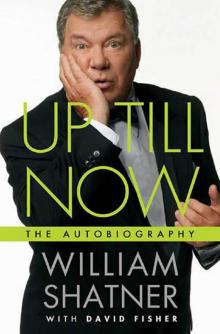 Up Till Now
Up Till Now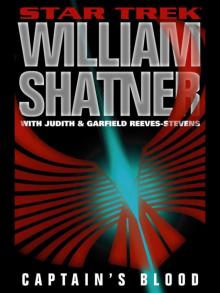 Captain's Blood
Captain's Blood TekWar
TekWar Tek Secret
Tek Secret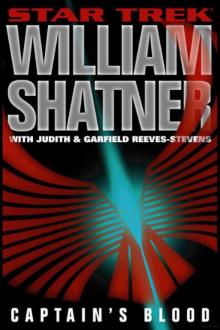 Captain's Blood зпвш-8
Captain's Blood зпвш-8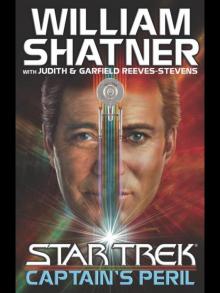 Captain's Peril
Captain's Peril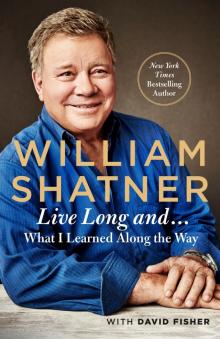 Live Long and . . .
Live Long and . . .